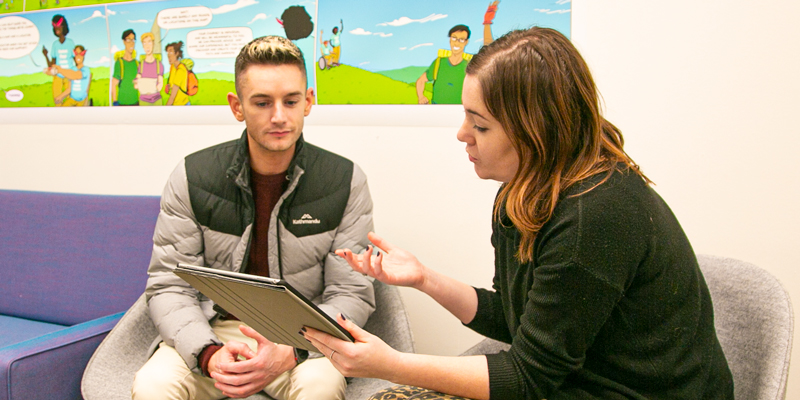Develop your skills and experience
University is the perfect time to develop and refine the skills you need to enhance your academic studies, and give you a head start on achieving your goals.

Improve your skills on EmployMe
Understand the skills you have and how to apply them in the workplace with EmployMe. Visit the platform to access our resources and see which skills industry professionals are looking for.
The two main skill sets that you should aim to develop are:
- Professional or technical skills: specific skills required by your field of interest, acquired through study and related work experience.
- Employability skills: transferable skills common to all work roles and workplaces, acquired through study and work experience, but also through a range of work and other life experiences.
Assessing your employability skills
Employability skills are viewed by employers as important for success in the workplace.
Examples of employability skills include:
- Interpersonal and communication skills (consistently rated as the most important)
- Teamwork
- Time-management
- Initiative
- Problem solving
- Resilience.
Consider conducting a skills audit to assess your employability skills and how you can develop them further.
How can I improve my skills?
-
Find a mentor
A mentor can expand your knowledge of the skills you need to develop in your field of interest and industry. Mentors can also help you explore future employment pathways after graduation, and help you get the most out of your study.
If you’ve had a mentor in the past, you might also consider becoming a mentor to support others in your community or industry.
Mentoring is an effective way to develop empathy, active listening, and rapport-building skills, which are relevant to a range of professional opportunities requiring interpersonal and communication skills.
-
Join a student club or network
Extracurricular activities provide great entry-level skill development and networking opportunities, and many of them are on campus.
Groups like the Student Peer Leader Network and student clubs can help you develop skills such as event organising, project management, teamwork, communication, leadership and more.
-
Apply to study overseas
Studying overseas can be a life-changing experience—providing you with new insights into your preferences, choices and ideas about your future.
Other benefits include gaining cross-cultural communication skills, greater cultural awareness, new connections, as well as skills in self-management, planning and resourcefulness.
These skills all contribute to developing your ability to thrive in today's diverse global market. We offer a range of options if you’re interested in studying overseas.
-
Apply for an internship
Internships are a great way to gain insights into an industry or a specific organisation while developing your professional network.
They also provide an opportunity to demonstrate how you contribute to a workplace and may lead to an employment offer.
Internships can help you develop critical technical or vocational skills that you can add to your resume and speak to in future interviews or applications.
-
Find a volunteering opportunity
Volunteering is a chance to gain new skills and build your professional network in the industry of your choice. Volunteering roles are often diverse and will give you the opportunity to take on more responsibility than in an entry-level paid position.
Before you choose a place to volunteer, it's good to learn about the organisation you’re interested in working with.
- Find out what the organisation does: research website information, previous projects or annual reports to find out whether the organisation can offer the experience you’re looking for.
- Assess whether they match your skills and interests and whether there’s opportunity to develop transferable and professional skills related to your area of interest.
- Think about how much time you can commit to the position. Are you looking for a position that’s long term or short term, a one-off event or a continuing role?
- Understand insurance: does the organisation have appropriate volunteer policies in place and insurance to cover you for the volunteer work you complete?
Volunteering on campus
Volunteering opportunities are available through a range of organisations on campus, including:
- UMSU
- The Grainger Museum
- Peer Support Program
- Engineers without borders
- Melbourne Microfinance Initiative
- Museums and Collections Projects Program
- The Royal Melbourne Hospital
- Melbourne Peer Mentor Program
- Become a Sustainability Volunteer
Find out about opportunities in your industry or discipline by enquiring with your faculty.
Volunteering off campus
We regularly advertise specific volunteer positions on Careers Online. These positions are directly linked to potential employment pathways and usually require you to complete and submit a formal application to be considered.
Volunteer rights and responsibilities
Volunteering Australia outlines the basic rights of a volunteer, as well as providing a volunteer checklist.
-
Enrol in further study
Many career paths require further study or additional certifications for entry level roles. Developing specific technical skills that are directly related to a potential role can be highly valued by employers and workplaces.
Formally recognised qualifications offered by universities and other registered training providers can help you to develop your skills through study.
Visit our further study page for more information.

Develop your skills with the LMS
Take our career quiz to find out what your career readiness stage is. Or explore the free self-paced learning modules on everything from finding the right career path to preparing for interviews. Join the community now to start building your employability skills.